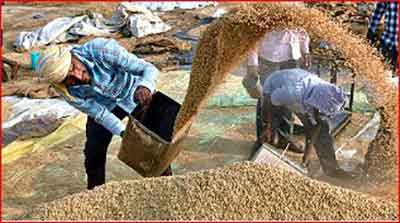Date: 17/03/2023
Relevance: GS-2: Bilateral, regional, and global groupings and agreements involving India and/or affecting India’s interests.
Key Phrases: BIMSTEC intra-regional trade, BIMSTEC, Fragmented markets, Internal Integration, agri-food sector, people-to-people contacts.
Context:
- There have long been Indian voices calling for strengthened agricultural cooperation among the countries of South and Southeast Asia in the Bay of Bengal Initiative for Multi-Sectoral Technical and Economic Cooperation (BIMSTEC), which was founded in 1997.
- However, trade and market integration is an area where the performance of BIMSTEC countries has been subpar.
Key Highlights:
- Trade and investment are major instruments to attain food security across the BIMSTEC member-states, particularly in a climate-affected, post-pandemic world.
- The share of all BIMSTEC countries — that include two ASEAN member-states, namely, Thailand and Myanmar — in world trade is less than 4 per cent.
- The BIMSTEC intra-regional trade was at $70 billion in 2021, significantly lower than ASEAN’s $600 billion, where exports were over $111 billion.
- Home to 1.8 billion people (22 percent of the global population, with a combined GDP of $3.6 trillion), the level of agri-food trade among BIMSTEC countries has been strikingly below potential.
About BIMSTEC
- It is a regional organization comprising seven member-states located in the Bay of Bengal region of South and Southeast Asia.
- The member-states are Bangladesh, Bhutan, India, Myanmar, Nepal, Sri Lanka, and Thailand.
- BIMSTEC was established in 1997 with the aim of promoting regional cooperation in various sectors, including trade, investment, energy, technology, tourism, agriculture, and fisheries.
- The organization's primary objective is to promote economic growth and development in the region through increased cooperation and integration.
- BIMSTEC's activities are focused on
- enhancing regional connectivity, trade and investment facilitation,
- energy cooperation, tourism promotion,
- technology transfer,
- and people-to-people contacts.
- The organization's activities are guided by its five priority areas, which are trade and investment, connectivity, energy, tourism, and people-to-people contact.
- It has a Secretariat based in Dhaka, Bangladesh, and its member-states meet annually at the BIMSTEC Summit to discuss regional cooperation and development issues.
What are the challenges associated?
- Fragmented markets:
- The agri-food sector in BIMSTEC member-states is characterized by fragmented markets.
- This makes it difficult for small farmers to participate in the value chain and access markets.
- Limited Infrastructure:
- Limited infrastructure such as roads, storage facilities, and refrigeration units are major impediments to the agri-food sector's development.
- This leads to significant post-harvest losses, which adversely affects farmers' incomes.
- Lack of Investment:
- The agri-food sector in BIMSTEC member-states suffers from a lack of investment, both in terms of financial and human capital.
- This has resulted in a lack of innovation, which is essential for value chain integration.
- Poor supply chain management:
- Inefficient supply chain management has resulted in high transaction costs, which makes it difficult for small farmers to access markets.
- Internal Integration:
- BIMSTEC’s progress is hindered by a lack of internal integration; countries adjacent to the Bay of Bengal are less integrated today than they were 50 years ago.
- Competition with proliferating regional trading arrangements:
- BIMSTEC agri-food trade is getting more challenging due to
competition with proliferating regional trading arrangements, such as
the
- Regional Comprehensive Economic Partnership (RCEP),
- and bilateral arrangements like the India-Australia free trade agreement (India is a party to no less than 28 bilateral or regional arrangements while Thailand is part of 23 arrangements).
- BIMSTEC agri-food trade is getting more challenging due to
competition with proliferating regional trading arrangements, such as
the
- Lack of product standardization and testing:
- BIMSTEC countries still do not have a shared system for product standardisation and testing.
- Lack of such arrangements significantly increases the time and costs of trade that disproportionally affect the agri-food sector.
Measures that can be taken:
- Improve infrastructure:
- Investments in rural infrastructure such as roads, storage facilities, and refrigeration units can reduce post-harvest losses and increase farmers' incomes.
- Encourage value chain integration:
- Public-private partnerships can be promoted to encourage value chain integration.
- This will help to improve supply chain management and reduce transaction costs.
- Provide access to finance:
- Small farmers need access to finance to invest in their farms and participate in the value chain.
- Microfinance institutions can be established to provide this support.
- Promote Innovation:
- Research and development can be promoted to encourage innovation in the agri-food sector.
- This will lead to the development of new products, processes, and services that can increase productivity and profitability.
- Provide training and education:
- Education and training programs can be established to improve farmers' skills and knowledge of best practices in farming, marketing, and value chain integration.
- Institutional changes:
- BIMSTEC needs institutional changes in order to enhance food safety and health attributes, which should be driven by mutual recognition and risk-based decision systems and standards that are recognized and credible across member states.
Conclusion:
- By implementing these measures, the agri-food sector in BIMSTEC member-states can be transformed into a dynamic and thriving sector that contributes significantly to the region's economic growth and development.
- A complete overhaul of thinking about agri-food trade within the global value chain framework — that includes an openness on both sides (importing and exporting) and scaling up on attributes like quality, safety, and health as product differentiators — is an essential precondition for BIMSTEC to become an effective platform for successful cooperation among the Bay of Bengal countries.
Source: The Hindu BL
Mains Question:
Q. The agri-food sector in BIMSTEC member-states has been characterized by a lack of specialization and value chain integration. Analyze the reasons behind this trend, and suggest measures. (250 Words).







